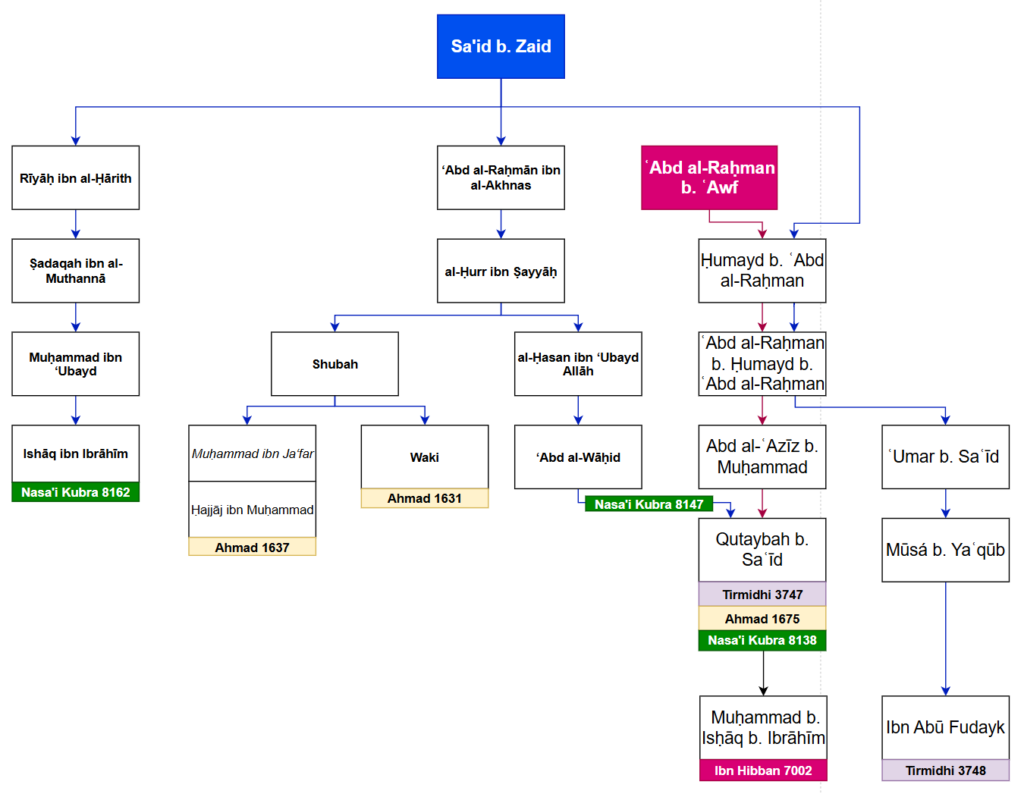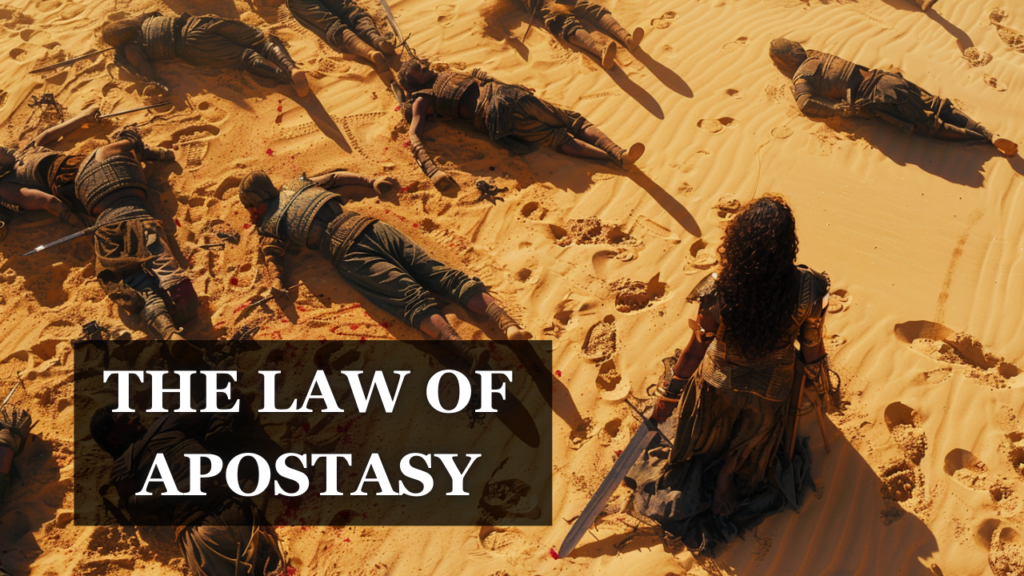The story of the Ten Promised Paradise (al-ʿAsharat al-Mubashsharah) is one of the most repeated and widely accepted hadiths in Sunni Islam. The Prophet is said to have named ten specific individuals and guaranteed their entry into Paradise. This group includes some of the most prominent companions:
Abu Bakr, ʿUmar, ʿUthman, ʿAli, Talhah, al-Zubayr, ʿAbd al-Rahman ibn ʿAwf, Saʿd ibn Abi Waqqas, Saʿid ibn Zayd, and Abu ʿUbaydah ibn al-Jarrah.
The transmission history of this hadith tells a very different story. Rather than a unanimous prophetic endorsement preserved by multiple independent witnesses, this tradition emerges from a narrow and politically entangled network of transmitters. This hadith does not reflect a historical statement of the Prophet. It’s a retroactive myth constructed by the companions’ descendants and ‘pious transmitters’ to glorify a curated list of early figures. Below are some examples of these hadith:
tirmidhi:3748 – Ṣāliḥ b. Mismār al-Marwazī > Ibn Abū Fudayk > Mūsá b. Yaʿqūb > ʿUmar b. Saʿīd > ʿAbd al-Raḥman b. Ḥumayd from his father > Saʿīd b. Zayd
from his father, that Sa’eed bin Zaid reported to him, while in a group of people, that the Messenger of Allah ﷺ said: “Ten are in Paradise: Abu Bakr is in Paradise, ‘Umar is in Paradise. ‘Ali and ‘Uthman are in Paradise. Az-Zubair and Talhah, ‘Abdur-Rahman, Abu ‘Ubaidah and Sa’d bin Abi Waqqas” – He said: “So he counted these nine and was silent concerning the tenth – so the people said: ‘We implore you by Allah, O Abu Al-A’war, who is the tenth?’ He said: ‘You have implored me by Allah. Abu Al-A’war is in Paradise.'” [Abu ‘Eisa] said: [Abu Al-A’war] he is Sa’eed bin Zaid bin ‘Amr bin Nufail. I heard Muhammad saying: “It is more correct than the first Hadith.”
ibnhibban:7002 – Muḥammad b. Isḥāq b. Ibrāhīm a freed slave of Thaqīf > Qutaybah b. Saʿīd > ʿAbd al-ʿAzīz b. Muḥammad > ʿAbd al-Raḥman b. Ḥumayd b. ʿAbd al-Raḥman from his father > ʿAbd al-Raḥman b. ʿAwf[Machine] The Prophet ﷺ said, “Ten are in Paradise: Abu Bakr is in Paradise, Umar is in Paradise, Uthman is in Paradise, Ali is in Paradise, Zubayr is in Paradise, Talhah is in Paradise, Ibn Awf is in Paradise, Saad is in Paradise, Sa’id bin Zaid is in Paradise, and Abu Ubaidah bin al-Jarrah is in Paradise.”
tirmidhi:3747 – Qutaybah > ʿAbd al-ʿAzīz b. Muḥammad > ʿAbd al-Raḥman b. Ḥumayd from his father > ʿAbd al-Raḥman b. ʿAwf
that the Messenger of Allah ﷺ said: “Abu Bakr is in Paradise, ‘Umar is in Paradise, ‘Uthman is in Paradise, ‘Ali is in Paradise, Talhah is in Paradise, Az-Zubair is in Paradise, ‘Abdur-Rahman bin ‘Awf is in Paradise, Sa’d bin Abi Waqqas is in Paradise, Sa’eed bin Zaid is in Paradise, and Abu ‘Ubaidah bin Al-Jarrah is in Paradise.”
ahmad:1675 – Qutaybah b. Saʿīd > ʿAbd al-ʿAzīz b. Muḥammad al-Darāwardī > ʿAbd al-Raḥman b. Ḥumayd from his father > ʿAbd al-Raḥman b. ʿAwf
[Machine] “The Prophet ﷺ said Abu Bakr is in Paradise, Umar is in Paradise, Ali is in Paradise, Uthman is in Paradise, Talhah is in Paradise, Zubair is in Paradise, Abdul Rahman ibn Awf is in Paradise, Saad ibn Abi Waqqas is in Paradise, Said ibn Zaid ibn Amr ibn Nufayl is in Paradise, and Abu Ubaidah ibn al-Jarrah is in Paradise.”
nasai-kubra:8138 – Qutaybah b. Saʿīd > ʿAbd al-ʿAzīz b. Muḥammad > ʿAbd al-Raḥman b. Ḥumayd from his father > ʿAbd al-Raḥman b. ʿAwf
[Machine] The Messenger of Allah ﷺ said, “Abu Bakr is in Paradise, and Umar is in Paradise, and Uthman is in Paradise, and Ali is in Paradise.” He also said another time, “And Ali is in Paradise, and Uthman is in Paradise, and Talhah is in Paradise, and Zubayr is in Paradise, and Abdur-Rahman ibn Awf is in Paradise, and Saad ibn Abi Waqqas is in Paradise, and Abu Ubaydah ibn al-Jarrah is in Paradise.”
Saʿid ibn Zayd: The Self-Included Saint
Most variants of the hadith trace back to Saʿid ibn Zayd—one of the “ten” named. In narrations through Riyah ibn al-Harith, ʿAbd al-Rahman ibn al-Akhnas, and Humayd ibn ʿAbd al-Rahman, Saʿid names himself among the ten promised Paradise. In fact, some narrations report that he initially says “nine” and then leaves the tenth unspoken—only to later clarify that he meant himself.

A narrator, including himself in a chain that glorifies his own personhood, violates the basic critical principle of hadith transmission: lack of self-interest. Unlike narrations where companions praise others, Saʿid is naming himself directly. That alone should prompt these transmissions to be scrutinized.
ʿAbd al-Rahman ibn ʿAwf: Authentic or Appropriated?
Another transmission path routes through ʿAbd al-Rahman ibn ʿAwf—also one of the ten—but his son, Humayd ibn ʿAbd al-Rahman, is the one reporting it. Intriguingly, Humayd also appears in transmissions that go back to Saʿid ibn Zayd. This dual appearance places Humayd in a position of narrative control: he could harmonize, blend, or even originate this list.
This raises a serious possibility: that Humayd synthesized the list from both his father’s name and Saʿid’s assertion. In doing so, he could create a powerful, unified narrative that canonized a fixed group of “righteous elite.” Rather than deriving the list from multiple independent eyewitnesses, it likely passed through the hands of one or two influential transmitters with a personal stake in the matter.
Far from being a consistent tradition, the content (matn) of the hadith fluctuates wildly:
- Some reports name only eight or nine companions.
- Others end with a vague phrase: “If I wanted to, I would name the tenth.”
- Still others make the tenth person the Prophet himself.
- In a few, Saʿid explicitly names himself as the tenth.
This lack of consistency undermines the entire premise of a fixed, divinely guaranteed list. Rather than reflecting a clear statement from the Prophet, the hadith appears to reflect a gradual shaping of memory, possibly for hagiographical or political reasons.
The Quran is unequivocal about one thing: salvation is earned, not inherited. It repeatedly affirms that “no soul shall bear the burden of another” (6:164) and that even the Prophet himself does not know what will happen to others (46:9). To claim that ten individuals were guaranteed Paradise in their lifetimes regardless of their future actions, is not only textually unsupported but theologically incoherent within the Quran.
[46:9] Say, “I am not different from other messengers. I have no idea what will happen to me or to you. I only follow what is revealed to me. I am no more than a profound warner.”
Summary of Transmission History
Humayd ibn ʿAbd al-Rahman received the hadith directly from its apparent originator, Saʿid ibn Zayd. He then fabricated an alternative chain of transmission by attributing the report to his father, ʿAbd al-Rahman ibn ʿAwf—one of the ten supposedly promised Paradise. Meanwhile, Saʿid is also known to have transmitted the same narration through other channels, not only including himself among the ten but also naming Ibn ʿAwf, Humayd’s father. This overlapping narrative structure suggests that the hadith likely originated with Saʿid, with Humayd playing a key role in reinforcing and canonizing it through strategic attribution. The fabrication thus appears to be a coordinated effort between Saʿid and Humayd, designed to establish a fixed list of righteous elites.

